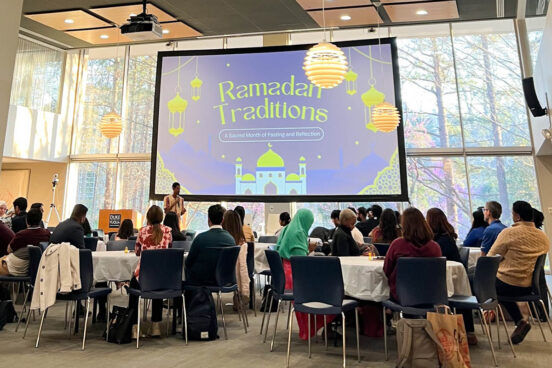Duke Daytime MBA Student Blog

Sharing My Faith at Fuqua
As part of its focus on shaping future leaders who embrace diversity, I was happy to see that Fuqua offers many resources to students with religious identities.

My heart sank during my first week at Fuqua in a diversity training where students were asked to write down their meaningful identity and share with a group. I wanted to write that I was a member of the Church of Jesus Christ of Latter-day Saints but feared ridicule.
After gathering some courage, I shared with my group, and to my surprise, I was met with sincere questions like, “Oh, don’t you guys have missionaries? Did you serve a mission?” This experience reinforced Fuqua as a school that emphasizes shaping future leaders who exude a high “decency quotient.”
Sharing and Respecting Faith
For many individuals, faith and spirituality is a major part of their identity. Therefore, as more and more companies promise to honor employee’s authentic selves, thoughtful business leaders must also respect faith traditions as they do with race, sexual orientation, and all other identities of their diverse workforces. As part of its focus on shaping future leaders who embrace diversity, I was happy to see that Fuqua offers many resources to students with religious identities.
Currently, there are several different religious clubs at Fuqua, including Catholics @ Fuqua, Christian Business Fellowship, Jewish Business Association, Muslims in Business, and the Latter-day Saints Student Association. Each club offers opportunities to practice their respective beliefs, serve the surrounding community, and build friendships.

These groups also participate in activities together, including an annual interfaith discussion panel and other spaces that allow students to discuss different beliefs in a safe environment. Fuqua also helped me to attend a conference for LDS MBAs at Stanford last April, which provided networking with individuals who shared my faith foundation.
Talking About Faith With Your Peers
While Fuqua provides great resources and is filled with well-intentioned people, sometimes mistakes are made. For example, when a classmate discovered I lived in Utah, he bluntly asked if I was Mormon, an improper slang term for my religion, and mentioned that I probably wouldn’t be fun at parties because I don’t drink alcohol. While I laughed to avoid feeling awkward, I felt judged and reduced to a stereotype.
To avoid offending anybody with a faith tradition, below are some tips to navigate common pitfalls.
1. Understand that religious topics are deeply sensitive.
This seems obvious, but many religious individuals consider their beliefs sacred. Ask if they are willing to share first and seek to listen and gain understanding if they do. People love sharing what matters deeply to them, but only if it is respected.
2. Don’t avoid the topic.
If we as business leaders want to encourage people to be their authentic selves, we cannot avoid the tough discussions. Spiritual conversations should be reinforcing and positively inquisitive. The other person should feel empowered by the conversation and grateful you asked thoughtful questions, including, “I’ve heard this, what are your thoughts or beliefs? What challenges do you have living your faith in your professional life? How has it made you a better person?”
3. Recognize personal choice and don’t generalize.
Just because one individual practices their faith a certain way, it does not mean everybody practicing that faith acts exactly the same way. Spirituality is unique to the individual and should be respected as such.
During my summer internship, I had great conversations with a co-worker who is a practicing Sikh. We asked each other deep questions regarding each other’s beliefs and discovered many similarities. I looked forward to speaking with him because he made me feel valued and taught me more about his faith, and he became a true friend as a result. My hope is that all students at Fuqua will help their classmates feel the same way my friend did and will continue to do so throughout their careers.



